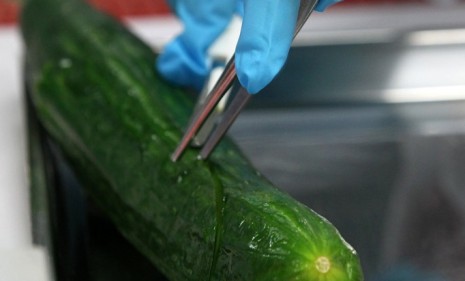Germany's 'mutant' E. coli outbreak: Is the world at risk?
The World Health Organization says a deadly rash of E. coli cases from German produce were caused by a highly toxic, never-before-seen strain of the bacteria. Are we on the cusp of a global pandemic?

A free daily email with the biggest news stories of the day – and the best features from TheWeek.com
You are now subscribed
Your newsletter sign-up was successful
One of the worst outbreaks of E. coli ever seen is sweeping across Europe, and has even landed in the U.S., striking nearly 2,000 people and bringing along a dangerous kidney disorder. Behind the outbreak is a new "mutant" strain of the bacteria that the World Health Organization is calling "super-toxic." How worried should we be?
How bad is the outbreak?
It has killed at least 18 people — 17 in Germany and one in Sweden. As of Thursday, about 1,730 people had been reported infected, and about 550 of them were hit by a dangerous kidney complication called hemolytic uremic syndrome (HUS). That makes this outbreak "the deadliest in modern history to involve E. coli, and among the top three in terms of the number of people ill," says The Wall Street Journal, and it's well on track to break all E. coli records.
The Week
Escape your echo chamber. Get the facts behind the news, plus analysis from multiple perspectives.

Sign up for The Week's Free Newsletters
From our morning news briefing to a weekly Good News Newsletter, get the best of The Week delivered directly to your inbox.
From our morning news briefing to a weekly Good News Newsletter, get the best of The Week delivered directly to your inbox.
How is this strain different?
The WHO says it is a "completely new" strain of E. coli that is unusually toxic and infectious. To make matters worse, it also is resistant to antibiotics. Berlin's Robert Koch Institute argues that it isn't truly new, but a "hybrid-clone" of two or more known strains. This "mutant" bug combines a particularly virulent E. coli strain and an unusually strong "glue" that sticks it to the intestine wall, says U.S. food-borne disease expert Robert Tauxe.
What is the source of the outbreak?
Scientists are frantically trying to identify what is carrying the bacteria, but the working theory is that cucumbers or tomatoes are the culprits. Germans are being advised to avoid those two vegetables, plus lettuce. The outbreak is centered in Hamburg and surrounding areas in northern Germany.
A free daily email with the biggest news stories of the day – and the best features from TheWeek.com
Who is falling ill?
The strain is unusual in that it mostly affecting young adults, and mostly women, while most normal E. coli outbreaks hit children and the elderly the hardest. "The most simple explanation is that because women tend to eat more salad than men and children, their risk becomes higher," says Dr. Bob Adak of Britain's Health Protection Agency.
Is it spreading?
Infections of this E. coli strain or the related HUS have been reported in 12 countries, including two or three cases in the U.S., but almost all of the patients had recently traveled to northern Germany. The bug doesn't appear to be spreading from person to person, says Dr. Tauxe. But until public health officials identify the source of the outbreak, the disease could spread through contaminated produce. Russia, Europe's biggest market for vegetables, banned all produce on Thursday.
Should people outside Europe be worried?
The European Union called Russia's total ban "disproportionate," given the limited risk. Many countries are still importing German vegetables. But some public health officials warn that this strain is powerful enough to spread from human to human. "People are being told to wash their vegetables and wash their hands," says Dr. Marc Siegel in Fox News, but "this type of bacteria is so virulent and so tiny that we can't wash enough of it away to stop it" — and no amount of washing will kill the "second pathogen" that's hitching a ride, "fear." My advice, says Michelle Deal-Zimmerman in The Baltimore Sun, is that anyone headed to Germany should "stick to the beer and pretzels for now."
Sources: NY Times, AFP, BBC News, Wall St. Journal, Daily Telegraph, Sky News, Fox News, Baltimore Sun
-
 The Olympic timekeepers keeping the Games on track
The Olympic timekeepers keeping the Games on trackUnder the Radar Swiss watchmaking giant Omega has been at the finish line of every Olympic Games for nearly 100 years
-
 Will increasing tensions with Iran boil over into war?
Will increasing tensions with Iran boil over into war?Today’s Big Question President Donald Trump has recently been threatening the country
-
 Corruption: The spy sheikh and the president
Corruption: The spy sheikh and the presidentFeature Trump is at the center of another scandal